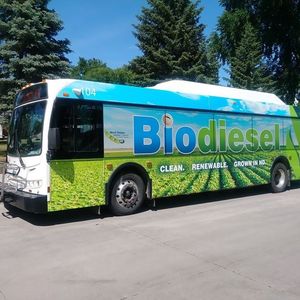City buses in Grand Forks, North Dakota, running on B20 biodiesel

Photo: Cities Area Transit via Facebook
July 16, 2020
BY The North Dakota Soybean Council
This summer Cities Area Transit buses in Grand Forks, North Dakota, are running on a different fuel than normal. CAT recently switched to fueling its fleet with B20, a blend of 20 percent biodiesel and 80 percent petroleum diesel.
Biodiesel is produced from a variety of feedstocks including the oil found in soybeans grown right here in North Dakota. It is a clean, renewable alternative to diesel fuel, typically blended into diesel fuel in varying ratios from 5 to 20 percent.
Biodiesel is a high-performance fuel. It enhances the lubricity of diesel, reducing wear and prolonging engine life. It acts as a detergent to keep injectors and fuel systems clean and has high cetane for quicker starts and less smoke. B20 provides all these benefits with no sacrifice to power or performance and no vehicle modifications are needed.
Advertisement
“North Dakota is home to important agricultural and petroleum resources that fuel our state’s economy,” said Dale Bergman, transportation division director of CAT. “B20 combines these two resources to fuel our transportation.”
To help introduce residents to biodiesel and its benefits, the Route 7 bus that travels from downtown, along Washington Street and around the shopping hub is sporting a full biodiesel wrap. Biodiesel messaging can also be seen on the backs of three other bus routes throughout the city. The wraps are a partnership between CAT, the North Dakota Soybean Council and the National Biodiesel Board.
Advertisement
A 20 percent biodiesel blend also cuts lifecycle greenhouse gas emissions by 15 percent compared to straight petroleum diesel. Ali Rood, CAT mobility manager, said, “Utilizing public transit helps Grand Forks residents reduce the impact of transportation on the environment. Using public transit fueled by a clean, more renewable fuel blend reduces the impact even further.”
More than half of the biodiesel made in the U.S. is sourced from soybean oil, which adds value to each bushel of soybeans grown, supporting local farmers and businesses in North Dakota. “We are excited to have Cities Area Transit powering their buses with B20,” said Stephanie Sinner, executive director of NDSC. “We hope other fleets in North Dakota will follow their example.”
Rob Rose, NDSC director from Wimbledon, also shared his excitement. “This is a great example of successful, farmer-led investment of our soybean checkoff dollars in education and market development for value-added products,” he said. “As a North Dakota soybean farmer, I’m proud to be a part of helping bring this North Dakota-grown fuel to Cities Area Transit.”
Related Stories
Luxury North Dakota FBO, Overland Aviation—together with leading independent fuel supplier, Avfuel Corp.— on May 19 announced it accepted a 8,000-gallon delivery of sustainable aviation fuel (SAF) on May 12.
Neste and FedEx, the world’s largest express cargo airline, have agreed on the supply of 8,800 metric tons (more than 3 million gallons) of blended Neste MY Sustainable Aviation Fuel to FedEx at Los Angeles International Airport (LAX).
Wheels Up Experience Inc. on May 6 announced the launch of its new SAF program, under which Wheels Up will partner with Delta Air Lines to purchase SAF, allowing private fliers to participate regardless of their flight operator or departure airport.
The USDA reduced its estimate for 2024-’25 soybean use in biofuel production in its latest WASDE report, released May 12. The agency expects soybean oil use in biofuel to increase during the 2025-’26 marketing year.
HutanBio's microalgal biofuel production shown to be net-negative in an independent life cycle assessment by EcoAct
HutanBio on May 8 announced that the production process for its proprietary HBx microalgal biofuel achieves net-negative carbon emissions, based on an independent cradle-to-gate life cycle assessment (LCA) conducted by EcoAct.
Upcoming Events










